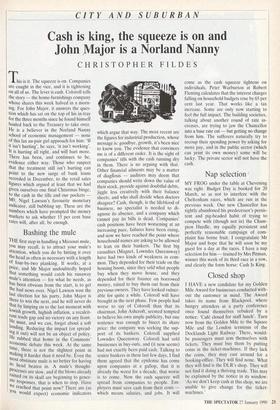Bashing the mule
THE first step in handling a Missouri mule, You may recall, is to attract your mule's attention, which you do by hitting it over the head as often as necessary with a length of four-by-two planking. It works, at a price, and Mr Major undoubtedly hoped that something would catch his runaway
has attention — for what he needs, as 'ins been obvious from the start, is to get the bad news over. Nigel Lawson won the last election for his party, John Major is there to win the next, and he will never do that by limping on to the last moment with lowish growth, highish inflation, a recalcit- rant trade gap and no victory on any front. He must, and we can, forget about a soft landing. Reducing the impact (or spread- ing it out) will not be an object of policy. He rubbed that home in the Commons' economic debate this week. At the same time, there is not the slightest point in Making it harder than it need be. Even the most obstinate mule is no better for having its head beaten in. A mule's thought- processes are slow, and if the blows already rained on its skull are beginning to gener- ate responses, that is when to stop. Have We reached that point now? There are (as You would expect) economic indicators
which argue that way. The most recent are the figures for industrial production, whose message is: goodbye, growth, it's been nice to know you. The evidence that convinces me is of a different order. It is the sight of companies' tills with the cash running dry in them. There is no arguing with that. Other financial ailments may be a matter of diagnosis — auditors may deem that companies should write down the value of their stock, provide against doubtful debts, jiggle less creatively with their balance sheets, and who shall decide when doctors disagree? Cash, though, is the lifeblood of business, no specialist is needed to di- agnose its absence, and a company which cannot pay its bills is dead. Companies' cash positions have been worsening at an increasing pace, failures have been rising, and now we have reached the point where househould names are asking to be allowed to lean on their hankers. The first big casualties (Magnet, Lowndes Queensway) have had two kinds of weakness in com- mon. They depended for their trade on the housing boom, since they sold what people buy when they move house, and they depended for their finance on borrowed money, raised to buy them out from their previous owners. They have looked vulner- able for quite a while. Coloroll will have brought in the next phase. Few people had worse to say of Coloroll than that its chairman, John Ashcroft, seemed tempted to believe his own ample publicity, but one sentence was enough to bisect its share price: the company was seeking the sup- port of its bankers. Coloroll supplied Lowndes Queensway. Coloroll had sold businesses in buy-outs, and (it now seems) had not exactly been paid cash. Talking to senior bankers in these last few days, I find them agreed that the epidemic has come upon companies at a gallop, that it is already the worst for a decade, that worse is to come. Now the cash squeeze will spread from companies to people. Em- ployers must save cash from their costs — which means salaries, and jobs. It will come as the cash squeeze tightens on individuals. Peter Warburton at Robert Fleming calculates that the interest charges falling on household budgets rose by 65 per cent last year. That works like a tax increase. Some are only now starting to feel the full impact. The building societies, talking about another round of rate in- creases, are trying to jaw the Chancellor into a base rate cut — but getting no change from him. The sufferers naturally try to recoup their spending power by asking for more pay, and in the public sector (which can print its own money) some will be lucky. The private sector will not have the cash.


























































 Previous page
Previous page